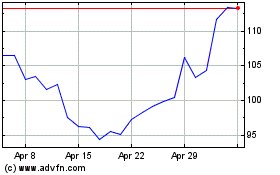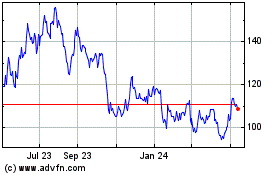SEOUL—Google's parent company Alphabet Inc. is challenging the
South Korean government over restrictions to its mapping services
in the country, in a rare public disagreement over policy.
Google contends that South Korea's national security laws, which
were designed to protect the country against infiltration from
North Korea, are outdated and unfairly inhibit the company's
ability to offer the full range of its Google Map services in South
Korea.
In most markets, Google is such a dominant player that
regulators have looked for ways to rein in its influence. The
European Union last month issued antitrust charges against Google
for allegedly abusing the dominance of its Android mobile-operating
system to push Google apps on their devices.
But South Korea is one of only a small handful of countries
where Google isn't the No. 1 search engine, alongside China and
Russia, where it lags behind domestic players Baidu Inc. and Yandex
NV, respectively. In South Korea, Naver, owned by Naver Corp., is
No. 1 in search and in mapping.
"The main point is national security," says Kim Tong-il, an
official at South Korea's Ministry of Land, Infrastructure and
Transport, which oversees mapping policy. Mr. Kim says that
Google's domestic Korean rivals, Naver and Kakao Corp., only use
government-supplied maps that have already had sensitive
installations blurred or camouflaged.
Google executives contend that the national security law in
South Korea is being used to protect Naver and Kakao, whose
local-language mapping services are dominant in the country of
about 50 million people.
Google has been raising concerns with officials ahead of a
closed-door meeting on Wednesday of top South Korean officials to
discuss deregulation and innovation, chaired by President Park
Geun-hye.
Google argues that South Korea's laws hamper innovation in the
country at a time when Ms. Park is touting startups to offset the
decline of the country's heavy industrial giants in shipbuilding
and petrochemicals. Ms. Park has made deregulation a centerpiece of
her economic policy, comparing excessive rules to "a malignant
tumor" that must face the "guillotine."
"We've had enough," says Kwon Bom-jun, the Google software
engineer, who is spearheading the push.
At issue for Google is the South Korean law that blocks
companies from exporting government-supplied map data, which it
says it must do to offer features like driving directions, public
transit information and satellite maps. Google says it has been
requesting a license from the Ministry of Land, Infrastructure and
Transport since 2008, without success.
Google says that it has had better luck in China, despite
pulling the plug on its mainland Chinese search product in 2010
amid a tussle with Beijing over blocking politically-sensitive
search items and a hacking incident.
Google said China hasn't blocked features of Google Maps since
2008, although some phones tested in Beijing on Tuesday could not
access the service's website or app.
Google says that it can offer a wider range of features in North
Korea than in South Korea, including driving directions from the
North's capital in Pyongyang to the Yongbyon Nuclear Scientific
Research Center, which takes about one hour and eight minutes
without traffic.
A Google Maps search for a driving route between the South's
capital in Seoul and its second-biggest city, Busan, turns up an
error message: "No routes found."
Google initially launched a bare-bones version of its Maps
service in South Korea in 2008, with plans to roll out a wider
array of services, including real-time traffic information, 3-D
maps and driving directions. That never happened, as the Seoul
government, citing national security, blocked Google's efforts to
export map data to data centers outside the territory.
Government officials say that, by not bringing its services into
compliance with its laws, Google would be leaving the country's
power plants, military installations and government facilities
exposed to potential danger.
Google would win an export license if it uses only the
blurred-out version, even for overseas users, government officials
say.
"Google already blurs out secure information for Google Korea,"
says Mr. Kim, who is a deputy director at the South Korean
ministry's National Geographic Information Institute. "We are
asking Google to do the same overseas."
Google refuses, pointing to the company's policy on disputed
territories in East Asia, where it labels the islands one way in
one country, and another way in the other country.
"This is why we have separate domain services," says Mr. Kwon,
the Google software engineer, in an interview. "Once we start to
unite the features, that will make chaos for other countries,
too."
For its bare-bones Google Maps service, the company uses
third-party servers in South Korea, but argues that its other
services are structured in a way that makes them reliant on Google
data centers situated around the world.
"No matter how many servers we have in Korea, we can't have all
of our Google Maps services handled there," Mr. Kwon said.
Min Sun Lee in Seoul and Eva Dou in Beijing contributed to this
article.
(END) Dow Jones Newswires
May 17, 2016 06:15 ET (10:15 GMT)
Copyright (c) 2016 Dow Jones & Company, Inc.
Baidu (NASDAQ:BIDU)
Historical Stock Chart
From Mar 2024 to Apr 2024

Baidu (NASDAQ:BIDU)
Historical Stock Chart
From Apr 2023 to Apr 2024
